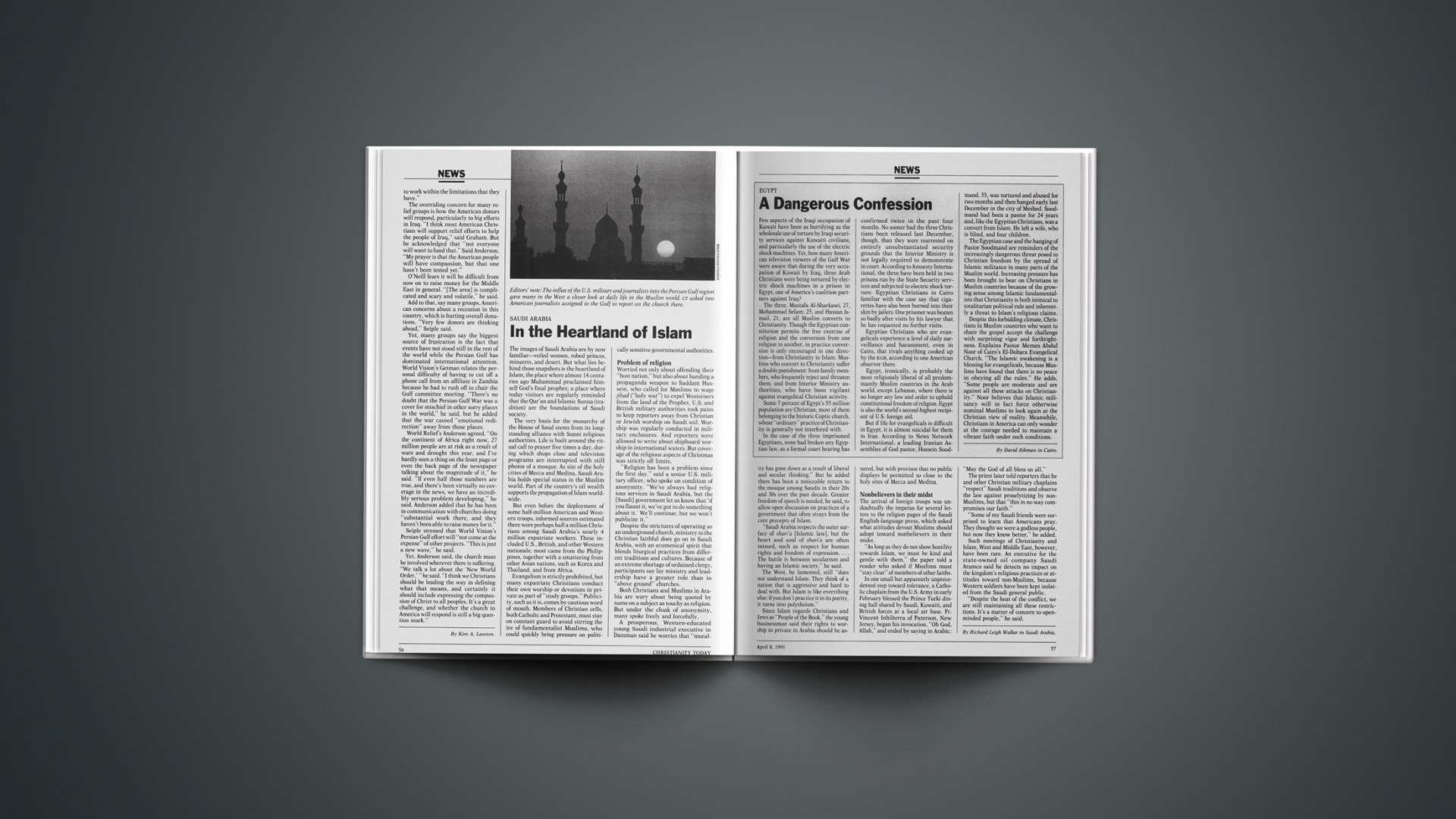Few aspects of the Iraqi occupation of Kuwait have been as horrifying as the wholesale use of torture by Iraqi security services against Kuwaiti civilians, and particularly the use of the electric shock machines. Yet, how many American television viewers of the Gulf War were aware that during the very occupation of Kuwait by Iraq, three Arab Christians were being tortured by electric shock machines in a prison in Egypt, one of America’s coalition partners against Iraq?
The three, Mustafa Al-Sharkawi, 27, Mohammad Selam, 25, and Hassan Ismail, 21, are all Muslim converts to Christianity. Though the Egyptian constitution permits the free exercise of religion and the conversion from one religion to another, in practice conversion is only encouraged in one direction—from Christianity to Islam. Muslims who convert to Christianity suffer a double punishment: from family members, who frequently reject and threaten them, and from Interior Ministry authorities, who have been vigilant against evangelical Christian activity.
Some 7 percent of Egypt’s 55 million population are Christian, most of them belonging to the historic Coptic church, whose “ordinary” practice of Christianity is generally not interfered with.
In the case of the three imprisoned Egyptians, none had broken any Egyptian law, as a formal court hearing has confirmed twice in the past four months. No sooner had the three Christians been released last December, though, than they were rearrested on entirely unsubstantiated security grounds that the Interior Ministry is not legally required to demonstrate in court. According to Amnesty International, the three have been held in two prisons run by the State Security services and subjected to electric shock torture. Egyptian Christians in Cairo familiar with the case say that cigarettes have also been burned into their skin by jailers. One prisoner was beaten so badly after visits by his lawyer that he has requested no further visits.
Egyptian Christians who are evangelicals experience a level of daily surveillance and harassment, even in Cairo, that rivals anything cooked up by the KGB, according to one American observer there.
Egypt, ironically, is probably the most religiously liberal of all predominantly Muslim countries in the Arab world, except Lebanon, where there is no longer any law and order to uphold constitutional freedom of religion. Egypt is also the world’s second-highest recipient of U.S. foreign aid.
But if life for evangelicals is difficult in Egypt, it is almost suicidal for them in Iran. According to News Network International, a leading Iranian Assemblies of God pastor, Hossein Soodmand, 55, was tortured and abused for two months and then hanged early last December in the city of Meshed. Soodmand had been a pastor for 24 years and, like the Egyptian Christians, was a convert from Islam. He left a wife, who is blind, and four children.
The Egyptian case and the hanging of Pastor Soodmand are reminders of the increasingly dangerous threat posed to Christian freedom by the spread of Islamic militance in many parts of the Muslim world. Increasing pressure has been brought to bear on Christians in Muslim countries because of the growing sense among Islamic fundamentalists that Christianity is both inimical to totalitarian political rule and inherently a threat to Islam’s religious claims.
Despite this forbidding climate, Christians in Muslim countries who want to share the gospel accept the challenge with surprising vigor and forthrightness. Explains Pastor Memes Abdul Noor of Cairo’s El-Dobara Evangelical Church, “The Islamic awakening is a blessing for evangelicals, because Muslims have found that there is no peace in obeying all the rules.” He adds, “Some people are moderate and are against all these attacks on Christianity.” Noor believes that Islamic militancy will in fact force otherwise nominal Muslims to look again at the Christian view of reality. Meanwhile, Christians in America can only wonder at the courage needed to maintain a vibrant faith under such conditions.










